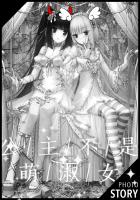While Squire Hawkwood and his colleagues entered,Ralph rose from his seat and advanced a few steps toreceive them, and his stately figure and dark countenanceas he bent courteously toward his guests had a naturaldignity contrasting well with the bustling importance ofthe squire. The old gentleman, according to invariablecustom, gave an elaborate preliminary flourish with hiscane in the air, then removed his three-cornered hat inorder to wipe his brow, and finally proceeded to makeknown his errand.
“My colleagues and myself,” began the squire, “areburdened with momentous duties, being jointly selectmenof this village. Our minds for the space of three days pasthave been laboriously bent on the selection of a suitableperson to fill a most important office and take uponhimself a charge and rule which, wisely considered, may beranked no lower than those of kings and potentates. Andwhereas you, our native townsman, are of good naturalintellect and well cultivated by foreign travel, and thatcertain vagaries and fantasies of your youth are doubtlesslong ago corrected, —taking all these matters, I say, intodue consideration, we are of opinion that Providence hathsent you hither at this juncture for our very purpose.”
During this harangue Cranfield gazed fixedly at thespeaker, as if he beheld something mysterious andunearthly in his pompous little figure, and as if the squirehad worn the flowing robes of an ancient sage instead ofa square-skirted coat, flapped waistcoat, velvet breechesand silk stockings. Nor was his wonder without sufficientcause, for the flourish of the squire’s staff, marvellous torelate, had described precisely the signal in the air whichwas to ratify the message of the prophetic sage whomCranfield had sought around the world.
“And what,” inquired Ralph Cranfield, with a tremor inhis voice— “what may this office be which is to equal mewith kings and potentates?”
“No less than instructor of our village school,” answeredSquire Hawkwood, “the office being now vacant by thedeath of the venerable Master Whitaker after a fifty years’
incumbency.”
“I will consider of your proposal,” replied Ralph Cranfield,hurriedly, “and will make known my decision within threedays.”
After a few more words the village dignitary and hiscompanions took their leave. But to Cranfield’s fancy theirimages were still present, and became more and moreinvested with the dim awfulness of figures which had firstappeared to him in a dream, and afterward had shownthemselves in his waking moments, assuming homelyaspects among familiar things. His mind dwelt upon thefeatures of the squire till they grew confused with thoseof the visionary sage and one appeared but the shadow ofthe other. The same visage, he now thought, had lookedforth upon him from the Pyramid of Cheops; the sameform had beckoned to him among the colonnades of theAlhambra; the same figure had mistily revealed itselfthrough the ascending steam of the Great Geyser. Atevery effort of his memory he recognized some trait of thedreamy messenger of destiny in this pompous, bustling,self-important, little-great man of the village. Amid suchmusings Ralph Cranfield sat all day in the cottage, scarcelyhearing and vaguely answering his mother’s thousandquestions about his travels and adventures. At sunset heroused himself to take a stroll, and, passing the aged elmtree, his eye was again caught by the semblance of a handpointing downward at the half-obliterated inscription.















